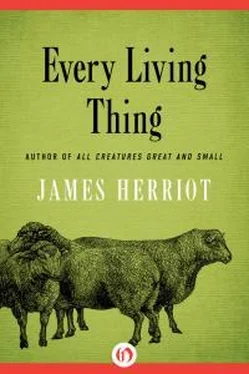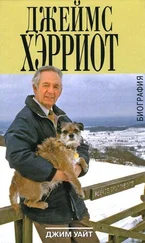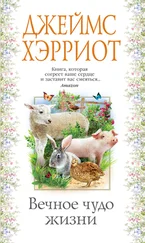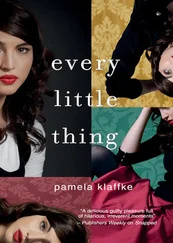Джеймс Хэрриот - Every Living Thing
Здесь есть возможность читать онлайн «Джеймс Хэрриот - Every Living Thing» весь текст электронной книги совершенно бесплатно (целиком полную версию без сокращений). В некоторых случаях можно слушать аудио, скачать через торрент в формате fb2 и присутствует краткое содержание. Год выпуска: 2011, ISBN: 2011, Издательство: Open Road Integrated Media LLC, Жанр: Домашние животные, на английском языке. Описание произведения, (предисловие) а так же отзывы посетителей доступны на портале библиотеки ЛибКат.
- Название:Every Living Thing
- Автор:
- Издательство:Open Road Integrated Media LLC
- Жанр:
- Год:2011
- ISBN:9781453227947
- Рейтинг книги:5 / 5. Голосов: 1
-
Избранное:Добавить в избранное
- Отзывы:
-
Ваша оценка:
- 100
- 1
- 2
- 3
- 4
- 5
Every Living Thing: краткое содержание, описание и аннотация
Предлагаем к чтению аннотацию, описание, краткое содержание или предисловие (зависит от того, что написал сам автор книги «Every Living Thing»). Если вы не нашли необходимую информацию о книге — напишите в комментариях, мы постараемся отыскать её.
Every Living Thing — читать онлайн бесплатно полную книгу (весь текст) целиком
Ниже представлен текст книги, разбитый по страницам. Система сохранения места последней прочитанной страницы, позволяет с удобством читать онлайн бесплатно книгу «Every Living Thing», без необходимости каждый раз заново искать на чём Вы остановились. Поставьте закладку, и сможете в любой момент перейти на страницу, на которой закончили чтение.
Интервал:
Закладка:
It very soon became clear that my stock had fallen to new depths, because I had only to step out of the back-door to send him scurrying away into the fields. The situation became so bad that I began to brood about it.
“Helen,” I said one morning. “This thing with Olly is getting on my nerves. I wish there was something I could do about it.”
“There is, Jim,” she said. “You’ll really have to get to know him. And he’ll have to get to know you.”
I gave her a glum look. “I’m afraid if you asked him, he’d tell you that he knows me only too well.”
“Oh, I know, but when you think about it, over all the years that we’ve had these cats, they’ve hardly seen anything of you, except in an emergency. I’ve been the one to feed them, talk to them, pet them day in, day out. They know me and trust me.”
“That’s right, but I haven’t had the time.”
“Of course you haven’t. Your life is one long rush. You’re no sooner in the house than you’re out again.”
I nodded thoughtfully. She was so right. Over the years I had been attached to those cats, enjoyed the sight of them trotting down the slope for their food, playing in the long grass in the field, being fondled by Helen, but I was a comparative stranger to them. I felt a pang at the realisation that all that time had flashed past so quickly.
“Well, maybe it’s too late. Is there anything I can do?”
“Yes,” she said. “You have to start feeding them. You’ll just have to make the time to do it. Oh, I know you can’t do it always, but if there’s the slightest chance, you’ll have to get out there with their food.”
“So you think it’s just a case of cupboard love with them?”
“Absolutely not. I’m sure you’ve seen me with them often enough. They won’t look at their food until I’ve made a fuss of them for quite a long time. It’s the attention and friendship they want most.”
“But I haven’t a hope. They hate the sight of me.”
“You’ll just have to persevere. It took me a long time to get their trust. Especially with Ginny. She’s always been the more timid one. Even now if I move my hand too quickly she’s off. Despite all that’s happened I think Olly might be your best hope—there’s a big well of friendliness in that cat.”
“Right,” I said. “Give me that food and milk. I’ll start now.”
That was the beginning of one of the little sagas in my life. At every opportunity I was the one who called them down, placed the food on the wall-top and stood there waiting. At first I waited in vain. I could see the two of them watching me from the log shed—the black-and-white face and the yellow, gold and white one observing me from the straw beds—but for a long time they would never venture down until I had retreated into the house. Because of my irregular life it was difficult to keep the new system going and sometimes when I had an early morning call they didn’t get their breakfast on time, but it was on one of those occasions when breakfast was over an hour late that their hunger overcame their fear and they came down cautiously while I stood stock-still by the wall. They ate quickly with nervous glances at me, then scurried away. I smiled in satisfaction. It was the first breakthrough.
After that there was a long period when I just stood there as they ate and they became used to me as part of the scenery. Then I tried a careful extension of a hand. They backed away at that, but as the days passed I could see that my hand was becoming less and less of a threat and my hopes rose steadily. As Helen had prophesied, Ginny was the one who shied far away from me at the slightest movement, whereas Olly, after retreating, began to look at me with an appraising eye as though he might possibly be willing to forget the past and revise his opinion of me. With infinite patience, day by day, I managed to get my hand nearer and nearer to him and it was a memorable occasion when he at last stood still and allowed me to touch his cheek with a forefinger. As I gently stroked the fur he regarded me with unmistakeably friendly eyes before skipping away.
“Helen!” I said, looking round at the kitchen window. “I’ve made it! We’re going to be friends at last. It’s a matter of time now till I’m stroking him as you do.” I was filled with an irrational pleasure and fulfilment. It did seem a foolish reaction in a man who was dealing every day with animals of all kinds, but I was looking forward to years of friendship with that particular cat.
I was wrong. At that moment I could not know that Olly would be dead within forty-eight hours.
It was the following morning when Helen called to me from the back garden. She sounded distraught. “Jim, come quickly! It’s Olly!”
I rushed out to where she was standing near the top of the slope near the log shed. Ginny was there, but all I could see of Olly was a dark smudge on the grass.
Helen gripped my arm as I bent over him. “What’s happened to him?”
He was motionless, his legs extended stiffly, his back arched in a dreadful opisthotonos, his eyes staring.
“I…I’m afraid he’s gone. It looks like strychnine poisoning.” But as I spoke he moved slightly.
“Wait a minute!” I said. “He’s still alive, but only just.” I saw that the rigor had relaxed and I was able to flex his legs and lift him without any recurrence. “This isn’t strychnine. It’s like it, but it isn’t. It’s something cerebral, maybe a stroke.”
Dry-mouthed, I carried him down to the house where he lay still, breathing almost imperceptibly.
Helen spoke through her tears. “What can you do?”
“Get him to the surgery right away. We’ll do everything we can.” I kissed her wet cheek and ran out to the car.
Siegfried and I sedated him, because he had begun to make paddling movements with his limbs, then we injected him with steroids and antibiotics and put him on an intravenous drip. I looked at him as he lay in the big recovery cage, his paws twitching feebly. “Nothing more we can do, is there?”
Siegfried shook his head and shrugged. He agreed with me about the diagnosis—stroke, seizure, cerebral haemorrhage, call it what you like, but certainly the brain. I could see that he had the same feeling of hopelessness as I had.
We attended him all that day and, during the afternoon, I thought for a brief period that he was improving, but by evening he was comatose again and he died during the night.
I brought him home and as I lifted him from the car his smooth, tangle-free fur was like a mockery now that his life was ended. I buried him just behind the log shed a few feet from the straw bed where he had slept for all the years.
Vets are no different from other people when they lose a pet and Helen and I were miserable. We hoped that the passage of time would dull our unhappiness, but we had another poignant factor to deal with. What about Ginny?
Those two cats had become a single entity in our lives and we never thought of one without the other. It was clear that to Ginny the world was incomplete without Olly. For several days she ate nothing. We called her repeatedly but she advanced only a few yards from the log house, looking around her in a puzzled way before turning to her bed. For all of those years, she had never trotted down that slope on her own, and over the next few weeks her bewilderment as she gazed about her continually, seeking and searching for her companion, was one of the most distressing things we had ever had to witness.
We fed her in her bed for several days and eventually managed to coax her onto the wall, but she could scarcely put her head down to the food without peering this way and that, still waiting for Olly to come and share it.
“She’s so lonely,” Helen said. “We’ll have to try to make a bigger fuss of her than ever now. I’ll spend more time outside talking with her, but if only we could get her inside with us. That would be the answer, but I know it can never happen.”
Читать дальшеИнтервал:
Закладка:
Похожие книги на «Every Living Thing»
Представляем Вашему вниманию похожие книги на «Every Living Thing» списком для выбора. Мы отобрали схожую по названию и смыслу литературу в надежде предоставить читателям больше вариантов отыскать новые, интересные, ещё непрочитанные произведения.
Обсуждение, отзывы о книге «Every Living Thing» и просто собственные мнения читателей. Оставьте ваши комментарии, напишите, что Вы думаете о произведении, его смысле или главных героях. Укажите что конкретно понравилось, а что нет, и почему Вы так считаете.












